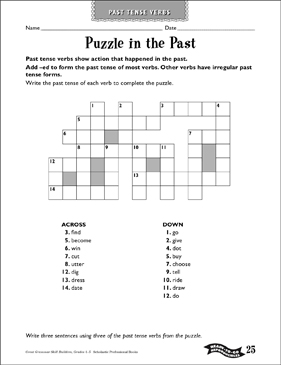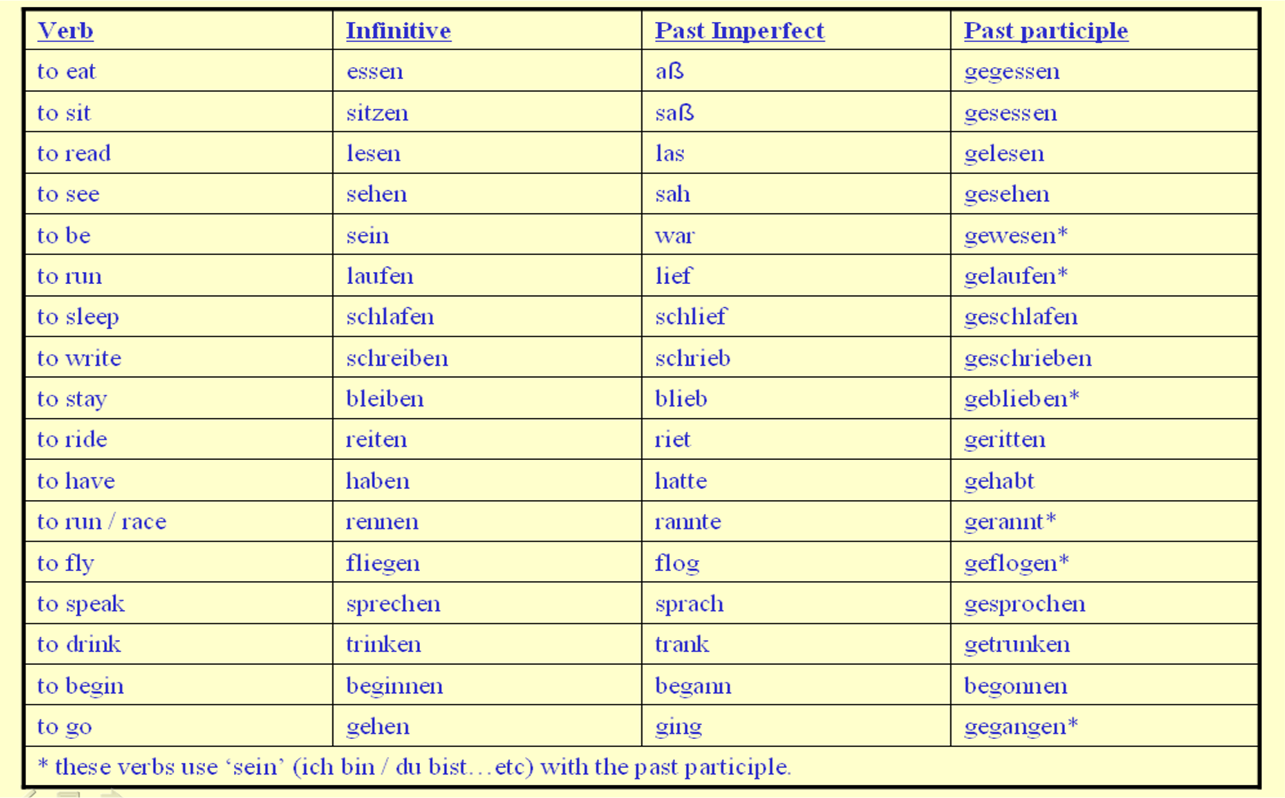
Lessons from the Top German Verbs list. This means that the majority of the verbs — 63 of them to be exact — are strong or irregular (mixed) verbs — verbs with unpredictable stem changes across verb tenses and moods. In fact, many of the most anomalous German verbs occur in the top 100. Because these verbs occur so frequently. The verb is the word we use to indicate the time of an event. Events may happen in the present tense, i.e. Right now or the past tense, ie; yesterday, four hours ago, or future tense, i.e. Tomorrow, in ten minutes.
34 thoughts on “ Irregular Past Tense Verbs – word lists, worksheets, activities, goals, and more”. Dawn Wolf I absolutely LOVE your website! It has saved me countless hours. The language units and the activities are great, as well as the numerous ways you have referenced and linked to the pages. Thank you ever so much. I will be referring all of our District’s speech pathologists to the site. I hate to even mention it, but wanted you to be aware that there is a mis-link in this (irregular past tense) unit.
Past Tense

Under “Word and Sentence Searches”, the very first sheet, the doc is correct but the pdf goes to a page from the “Category” unit. Thank you again for this masterful piece of work!. OK, I may be site illiterate, as far as being able to find things in the comments.
Past Tense Verbs Word List
I was informed of your reply to one of the questions asking for the verbs in developmental order, but all I could see was a partial listing: Word list in developmental order Functional ate, bit, blew, broke, built, caught, came, cut, did, drew, drank, fell, flew, found, got, gave, had, let, lost, made, put, read, ran, said, saw, sat, stood, stuck, told, took, threw, went, woke, won, wore, wrote, was Later Developing began, brought, became, bought, burnt, chose, dove, drove, dug, felt,. I tried to find this response, but don’t see it on the site here. Is there a more complete response?.
Post author Dawn, all I’m seeing is a question asking for irregular plurals in developmental order. I have a short list of those on the noun page (children, teeth, men, geese, women, feet, mice, sheep, people, deer, wolves, leaves, knives, phenomena, crises, etc.).
Past Tense Verbs Worksheets

To the best of my knowledge there just aren’t a whole lot of these other than some more highly specialized vocabulary. The verbs are at the top of this page.
It’s not meant to be an exhaustive list, but I think it has most of the common ones. Pingback:. Pingback:. Julie I’ve found this website very helpful on several occasions, and I love that you share the research behind queries/topics.
I am wondering where the verb lists (structured in such a way as developmental order) came from — your experience? Journal articles? I’m asking, not to critique the lists, but because, I find that there is a “soft structure” in most grammatical forms where children learn some words before others, but it’s difficult to find research on them. Post author I would say they’re loosely based on a combination of my experience with levels from tests such as the OWLS, CASL, PLS, and CELF tests, and consulting Brown’s levels as well as Robert Owen’s language textbook. The lists are meant to be flexible and one would expect these, or similar lists, to differ from culture to culture, or from region to region especially with some more “semantic” words like nouns and verbs, and maybe there’s more consistency with more “syntactic” words, like helping verbs and pronouns. Thanks for the comment!
Part Two The following verbs can be regular or irregular: Verb Past Simple Past Participle burn burned OR burnt burned OR burnt dream dreamed OR dreamt dreamed OR dreamt learn learned OR learnt learned OR learnt smell smelled OR smelt smelled OR smelt The second form (burnt, dreamt etc.) is more common in British English. Part Three Verbs that have the same form in Present, Past and Past Participle form: Verb Past Simple Past Participle bet bet bet broadcast broadcast broadcast cut cut cut hit hit hit hurt hurt hurt let let let put put put quit quit quit read read read set set set shut shut shut spread spread spread All of the verbs above are written and pronounced the same in the three forms EXCEPT for Read which is written the same but pronounced differently.
